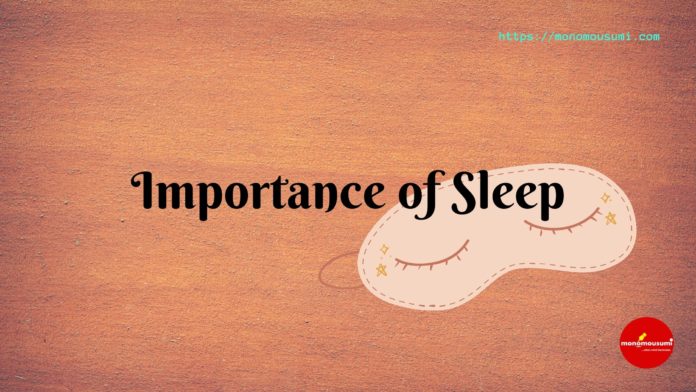In a world where people rarely have any time to take care of themselves, maintaining a healthy sleep cycle becomes almost impossible. While discussing physical or mental health, one activity that is always less talked-about is sleep. It is ironic that in a world where people are fighting with acute sleeplessness or insomnia and the majority of the world’s population do not sleep for even 6 or 7 hours, sleep is not given its due importance. Sleep in fact, can be beneficial for both physical and mental health.
How much sleep do humans of different age groups need?
• Most adults need 7 to 8 hours of good quality sleep each night on a regular day.
• Teenagers need to have 8 to 10 hours of sleep each night.
• Children within the ages of 6 to 12 should get around 9 to 12 hours of sleep each night.
• Pre-schoolers must sleep for around 10 to 13 hours a day (including naps) while toddlers need to sleep for 14 hours a day ( including naps).
• Babies need to sleep between 12 to 16 hours each day.
How does lack of sleep affect physical and mental health?
• British research studies show that people with irregular sleep patterns have more mortality rate than people with a healthy sleep cycle.
• Serious accidents have often been linked to sleeplessness since it causes fatigue.
• Sleep deprivation leads to chronic health issues. It is estimated that 90% of people who suffer from insomnia also suffer from another chronic health condition such as diabetes, stroke, heart disease etc.
• Lack of sleep causes depression and anxiety. In 2005, a poll suggested that most of the people suffering from depression, anxiety or stress sleep less than 6 hours. Insomnia is also frequently linked to depression.
• In teenagers, lack of sleep has been defined as one of the main causes that hurts their learning process. Thus, sleep is extremely essential to the cognitive process of learning. Lack of sleep also causes forgetfulness and impairs judgement.
• Shortening the sleep schedule causes overproduction of hormone gremlin which stimulates hunger and decreases the production of leptin which suppresses appetite. Thus, it may lead to weight gain. Chronic sleeplessness leads to secretion of cortisol which breaks down the protein in the skin that keeps it smooth and elastic. Therefore, it damages the skin and causes dark circles.
How to maintain a healthy sleep cycle?
• Natural sunlight or bright light during the day keeps the cardiac rhythm healthy. This boosts daytime energy as well as night-time sleep quality and duration. In people with insomnia, bright light exposure during the day is shown to increase sleep duration. Thus, light exposure during the day results in more sleep during the night.
• Decrease blue light exposure during the evening by installing apps that block blue light on smartphones and stop watching TV before going to bed. Blue light reduces melatonin that helps one relax and get deep sleep.
• Reduce the intake of drinks containing caffeine and do not drink any fluids 1 to 2 hours before going to bed. Also, reduction in consumption of alcohol can reduce Nocturia, a medical term for excessive urination at night.
• Exercise regularly for ample amounts of time since it improves sleep and health. According to researchers, exercise reduces time to fall asleep by 55%, total night wakefulness by 30%, anxiety by 15% while increasing the total sleep time period by 18%. But never exercise before sleeping since it increases the metabolic activity in the body which can stop one from falling asleep faster.
• Optimizing one’s bedroom environment by eliminating excess light and noise to get better sleep. Temperatures around 20°C are said to be optimum for a good night’s sleep. Comfortable pillows, mattresses and cushions also help the body to feel relaxed.
• Taking a relaxing warm bath or shower before going to bed, meditation, deep breathing, visualization, reading a book, intake of supplements such as lavender, magnesium and glycine can improve sleep quality and quantity.
• Reducing irregular and long irregular daytime naps and maintaining a consistent sleep schedule can help one to sleep better.
• A low carb diet or a high carb meal taken 4 hours before bed may help fall asleep faster. If one is used to having a low carb diet, they may fall asleep faster, indicating that carbs are not always necessary.
• There are many common conditions, such as sleep apnea that cause poor sleep. It is wise to consult with a health care provider in such a case.
How to know if one has a sleep disorder?
• Trouble falling or staying asleep, feeling tired even after a good night’s sleep, sleepiness during day to day activities are symptoms of mild sleep disorders.
• Frequent loud snoring, itchy feeling in arms and legs or trouble moving the limbs while waking up, gasping while sleeping also indicate sleep disorders.
What are some health benefits of having enough sleep?
• People who sleep well have a healthy immune system and are less prone to sickness.
• Enough sleep can prevent a person from gaining more weight and staying fit.
• People with regular sleep patterns are less likely to have any kind of cardiovascular disease or health problems.
• Sleep has often been linked to improved concentration and cognitive function. Thus it improves memory and increases productivity by manifold times.
• Proper sleep can help in energy boosting which in turn helps a person to work hard and exercise more. Sleep also reduces inflammation, which is thought to cause the body to detonate as we age.
• When one has a good night’s sleep, it makes the person feel more relaxed, have better coordination and make better decisions.
• A better sleep increases production of melatonin which in turn suppresses tumor growth and may help prevent cancer. Sleep can also reduce depression and anxiety.
Therefore, sleep is one of the most significant activities needed for a healthy lifestyle. During the COVID-19 pandemic, exposure to natural daylight has decreased . Consequently, more people, especially the youngsters, stay up all night or sleep at irregular times. Feelings of isolation, depression, anxiety, various other mental health issues, spending more time on laptops, mobiles and computers, disruption of our daily schedule during the lockdown has caused sleep deprivation among numerous people.
While, importance has been given to exercising and practicing yoga to stay healthy, sleep is not given it’s due respect. It is high time we start to sleep well and take care of ourselves. Connecting with loved ones, talking to new people online, maintaining a journal, or getting a new hobby adds joy to our lives and can help us relax and get a better night’s sleep.
By Srija Bandyopadhyay, West Bengal
















